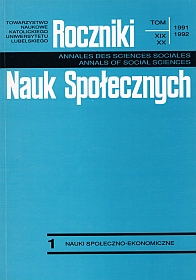Rodzina i społeczeństwo
Abstrakt
The author emphasizes that the family plays one of the central places in the popes' social teaching. Leon XIII in his Rerum novarum accepted the family as the most important social institution which is logically and in fact prior to other societies. Vatican Council II says more about persons who create a family than about the family as a society. The family is described as „a school of more profound manhood” there. John Paul II follows this line of reasoning. His considerations are not focused on the family but on the human person, his versatile development, including marriage and family. The personal development of individuals calls for a perfect co-existence of these two institutions, ie marriage and family. It has far-reaching consequences for the theology of matrimony and family, family law and pastoral practice. It concerns a many-sided preparation of persons for marital-familial life and for responsibility for the fate of these institutions.
The author thinks that the evolution of the understanding the family consists in that that Leon XIII takes it rather from the exterior, laying stress on its structural-functional bond. John Paul II, however, takes it from the interior, putting emphasis on the fact that two persons complement each other and thus develop.
The author emphasizes that the family is an autonomic society and fellowship of persons in relation to societies, state and other fellowships. It has a claim on many liberal, economic, social and cultural rights. Society and state should have in mind two principles when dealing with the family: auxiliariness and intervention. A duty to support the family lays also on the Church.
Copyright (c) 1992 Roczniki Nauk Społecznych

Utwór dostępny jest na licencji Creative Commons Uznanie autorstwa – Użycie niekomercyjne – Bez utworów zależnych 4.0 Międzynarodowe.


